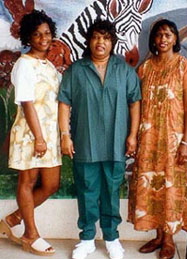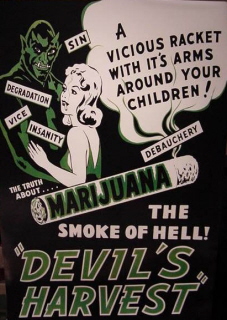A bill that would eliminate the crack/powder cocaine sentencing disparity by punishing federal crack offenses the same way it punishes powder offenses has passed a key committee vote and is headed for the House floor. Companion legislation is brewing in the Senate.
It appears increasingly likely that Californians will have a chance to vote on marijuana legalization next year. Two initiatives have been filed, one that would create legalization, one that would create semi-legalization. Is now the right time? Opinion in the movement is divided.
To kick off our summer fundraising drive, DRCNet is pleased to offer Ryan Grim's exciting new book, "This Is Your Country on Drugs: The Secret History of Getting High in America," as our latest membership premium. Things are happening, and the importance of your support at this time could not be greater.
Hardly a day goes by without another body being found in Mexico's prohibition-related violence, and the Mexican government is under increasing fire as the death toll rises. Now, thanks to upcoming journalist Bernd Debusmann Jr., the Chronicle will be watching and summarizing events on a weekly basis.
A potentially very ugly scandal is brewing in the DC suburbs, a Pennsylvania cop gets busted just after buying some smack, a California prison guard was peddling PCP, and a former Miami-Dade cop cops a plea in an Ecstasy sting.
As a state senator concerned with racial profiling, President Obama championed a bill requiring Illinois law enforcement agencies to report on traffic stops. The latest annual report is out and it's pretty much the same old story: Blacks and Hispanics are much more likely to be asked to consent to searches, but cops are much more likely to actually find contraband if the driver is white.
California's Proposition 36 "treatment not jail" law is likely to lead to neither treatment nor jail as its funding gets slashed by 83% because of the state's budget crisis.
Maine marijuana activist Don Christen is getting ready to do eight months behind bars after the state Supreme Court rejected his appeal in a marijuana cultivation case where he argued he was growing for patients.
With Cook County (greater Chicago) Board President Todd Stroger saying he will not veto last Tuesday's passage of a marijuana decriminalization ordinance, it looks like decrim is a done deal -- at least in unincorporated areas of the county. The move also gives towns and cities in the county the option to adopt decrim as well.
In 2005, voters in Denver approved the legalization of possession of up to an ounce of marijuana, though local authorities have since ignored that vote. Now, voters in the Colorado ski town of Breckenridge will get the same opportunity. A local initiative is headed for this November's ballot -- unless the town council just goes ahead and approves it first.
Somebody opened fire on Colombian soldiers and coca eradicators Monday, leaving of a toll of dead, wounded, and missing. There are plenty of suspects.
Events and quotes of note from this week's drug policy events of years past.
Do you read Drug War Chronicle? If so, we need your feedback to evaluate our work and make the case for Drug War Chronicle to funders. We need donations too.
"Want to Prevent Marijuana Growing on Public Land? Legalize It," "More Evidence That Marijuana Prevents Cancer," "Trick Question on the DEA Job Application?," "Cop Accidentally Reveals the Wisdom of Marijuana Legalization," "Drug Czar Gets Caught Lying and Contradicting Himself," "Mexico's Drug War is Eventually Going to Collapse," "Drug Warriors for Sensible Drug Policy," "Should Employers Provide Reimbursement for Medical Marijuana Costs?," "Crack Sentencing Reform Bill Passes Full Judiciary Committee," "More Big News: Needle Exchange Legislation Passes US House of Representatives," "Glorious Kyrgyzstan -- the Best Harm Reduction Program in Central Asia."
Apply for an internship at DRCNet and you could spend a semester fighting the good fight!
The House Judiciary Subcommittee on Crime, Terrorism, and Homeland Security Wednesday approved a bill designed to end the disparity in sentencing for federal crack and powder cocaine offenses. The bill, the Fairness in Cocaine Sentencing Act of 2009 (H.R. 3245), passed by a vote of 16-9 and now heads for a House floor vote.

the late Lillie Blevins, served life sentence for a crack cocaine ''conspiracy'' after being convicted on the word of a snitch who received probation in return (courtesy november.org)
Under laws passed in the midst of the crack cocaine panic of the 1980s, it takes 100 times as much powder cocaine as crack to trigger mandatory minimum sentences. For example, five grams of crack earns a five-year mandatory minimum, but it takes 500 grams of powder to garner the same sentence.
A majority of crack users are white, but more than 80% of federal crack prosecutions have been aimed at blacks. When Hispanics are added in, nearly 96% of all federal crack prosecutions have been aimed at non-whites.
The bill, sponsored by Rep. Bobby Scott (D-VA) addresses the disparity by removing all references to crack cocaine in federal sentencing laws and treating the two forms of the drug equally. Under the bill, it would take 500 grams of either crack or powder cocaine to trigger the mandatory minimum sentence. The bill would also eliminate mandatory minimum sentences for possession of any amount of crack.
"We have taken a big step today toward ending the disparity that exists between crack and powder cocaine sentencing," said Judiciary committee chair Rep. John Conyers (D-MI), who cosponsored the bill. "African Americans serve almost as much time in federal prison for a drug offense (58.7 months) as whites do for a violent offense (61.7 months), largely due to sentencing laws such as the 100-to-1 crack-powder cocaine disparity. Since 1980, the number of offenders in federal prisons for drug offenses has skyrocketed from less than 5,000 to almost 100,000 in 2009. Currently, drug offenders represent 52% of all federal prison inmates."
The crack/powder sentencing disparity has been the most glaring example of racially imbalanced drug enforcement in recent years and has been under attack not only by sentencing reform advocates, civil libertarians, and civil rights groups, but also by the US Sentencing Commission, which has for more than a decade called for its elimination. But any moves to address it languished during the Bush administration.
The atmosphere has changed with Democratic control of the White House and the Congress. Both President Obama and Attorney General Holder support ending the disparity, so do congressional Democrats, and even some congressional Republicans.
Remaining Republican hard-line drug warriors in the subcommittee attempted to subvert the spirit of the bill, resorting to time-honored anti-drug political tactics, but failed. Rep. Lamar Smith (R-TX), the ranking Republican on the committee, was concerned about sending messages. "The bill sends the wrong message to drug dealers and those who traffic in ravaging human lives. It sends the message that Congress does not take drug crimes seriously," he complained.
Rep. Darrell Issa (R-CA) introduced an amendment to address the disparity by making the current draconian penalties for crack apply to powder cocaine as well. He said he supported reducing the sentencing disparity, but "let's do it on the side of making sure our streets are safer, not less safe."
But committee Chairman Rep. John Conyers (D-MI) ruled the amendment out of order. It was then tabled on a 14-13 vote.
Rep. Melvin Watt (D-NC) captured the majority sentiment for ending the crack/powder sentencing disparity. "It did not work," he said. "We were wrong."
The vote was welcomed by sentencing reform advocates. "Today's vote is an historic first step in ending a 20-year injustice," said Michael Macleod-Ball, interim director of the ACLU's Washington Legislative Office. "Lawmakers must act now to eliminate the disparity between crack and powder cocaine sentencing by treating both forms of the same drug equally under federal law. Congress alone has the authority to put a stop to the crack-powder disparity and long mandatory minimum sentences."
"Justice won today," said Julie Stewart, president of Families Against Mandatory Minimums (FAMM). "Today's vote represents another step to restoring basic fairness to our sentencing laws and to fulfilling the Constitution's promise of equal justice under the law. We urge the full House to act quickly on this measure."
"It makes no more sense to punish crack cocaine offenders more harshly than powder cocaine offenders than it does to punish wine drinkers more harshly than beer drinkers. Crack and powder cocaine are two forms of the same drug," said Jasmine Tyler, deputy director of national affairs for the Drug Policy Alliance. "When all is said and done people will look back at this as a watershed moment -- the day that Congress began rolling back some of the drug war's worst excesses."
The bill still has to pass the House. On the Senate side, Majority Whip Richard Durbin (D-IL) is preparing to introduce his own measure to eliminate the sentencing disparity. It is expected to win bipartisan support from his fellow Judiciary Committee members.
back to top
Last month, Drug War Chronicle reported that cannabusinessman and dispensary operator Richard Lee, creator of Oaksterdam and founder of Oaksterdam University, had assembled a team of activists, attorneys, political consultants and signature-gathering pros for an initiative to tax and regulate marijuana in California they hoped to place on the November 2010 election ballot. Drug reform organizations were apprehensive, however, worrying the proposed initiative was too soon, the polling numbers weren't high enough, and that a loss could take the steam out of the legalization push for years to come.

Is reefer madness (e.g. marijuana prohibition) winding down?
Lee has pushed forward, such concerns notwithstanding; on Monday he and Oakland medical marijuana pioneer Jeff Jones filed the
Regulate, Control, and Tax Cannabis Act of 2010.
And then there were two. On July 15 -- two weeks prior, but with less heraldry -- a trio of NORML-affiliated Northern California attorneys filed the Tax, Regulate, and Control Cannabis Act of 2010.
To avoid confusion, we'll refer to the second as the Omar Figueroa initiative (coauthored by Joe Rogoway and James Clark) and the first as the Richard Lee initiative.
"Cannabis prohibition, like alcohol prohibition, is an expensive and ineffective waste of taxpayer money," said Figueroa.
"California's laws criminalizing cannabis have failed and need to be reformed," said Lee. "Cannabis is safer than alcohol. Cannabis doesn't cause overdose deaths or make people violent like alcohol. It makes sense to regulate cannabis like alcohol, instead of prohibiting it completely."
The Figueroa initiative is broader and would bring complete legalization under state law, while the Lee initiative would create semi-legalization, allowing adults to possess up to one ounce and grow their own in a 5' x 5' garden space. The Figueroa initiative would allow the state of California to tax marijuana sales, while the Lee initiative would allow cities and counties to tax marijuana sales. The Figueroa initiative would end marijuana prohibition statewide, while the Lee initiative would give cities and counties the local option to tax and regulate or not, but would also provide that people could still possess and grow the specified amounts even in locales that opt out of regulating.
"Our initiative repeals cannabis prohibition; Richard's just narrows the scope," said Figueroa, a San Francisco attorney specializing in medical marijuana and marijuana cultivation cases. "People would not be free to possess more than one ounce and there would be limitations on growing your own. And our initiative is going to have that big economic impact statement for the state budget that Richard's will not," he said.
"We worked for many weeks with Richard on his initiative, and we support both, but we think ours would result in more far-reaching change and would generate money for the state through tax revenues," Figueroa added. "We want to stimulate debate and provide an alternative to Richard's initiative, which we don't think would create enough change."
The initiative effort is moving forward and preparing to begin signature-gathering, said Figueroa, but its prospects are iffy. "We don't have the deep pockets Richard has," he said.
Lee has signed a $1.05 million contract with a signature-gathering organization and says he has already raised half of that sum. "We are confident we will be on the ballot," he said. "Then we need to raise another $10 to $20 million to win, depending on the opposition."
The initiatives come as the noise level around marijuana legalization in California grows ever louder. An April Field poll put support for legalization at 56%. Gov. Schwarzenegger said this year that the issue should be discussed, and the state Board of Equalization's estimate that legalization could generate $1.4 billion in revenue for the state has generated considerable interest. That estimate was a response to a bill before the legislature, Rep. Tom Ammiano's AB 390, which would legalize marijuana and allow the state to tax it.
Meanwhile, voters in Oakland last week overwhelmingly supported a special dispensary tax, another Richard Lee effort. And now the Los Angeles city council is considering doing the same thing.
The Figueroa initiative would appear to have more appeal to hard-core marijuana legalizers, but the Lee initiative has more money behind it and is more likely to actually make it to the ballot. That is making the Lee initiative the subject of more discussion as to its likelihood of passage. That discussion in turn has opened a window on just how complex the issues around legalization are, how difficult it is to create a "perfect" legalization initiative, and how difficult it is to decide if this is the time to act or whether it would be premature.
The major national marijuana and drug reform groups are generally skeptical that a legalization initiative can win in California in 2010. They also worry about the impact of a defeat on the movement.
"We're concerned about the timing and we're not sure it's the best worded initiative," said Dan Bernath, assistant communications director for the Marijuana Policy Project. "It is getting the conversation about marijuana policy reform going, but we're concerned it could set the movement back if it loses. We're more interested in Ammiano's bill," he said.
"We would like [the Lee initiative] to win," said Steven Gutwillig, California State Director for the Drug Policy Alliance, whose funding of Proposition 215 helped make medical marijuana legal in the state, "and we're not that concerned that losing would be an enormous setback to the movement unless it really loses big. We are looking to end marijuana prohibition as quickly and effectively as possible, and if this is the way to do it, we're all for it."
But unlike the Prop. 215 effort, DPA will be cheering from the sidelines. "We're not an official proponent of this and we're not in a position to fund a campaign of this scale anytime soon," said Gutwillig. "We're still relatively fresh from the $7.5 million campaign to pass Proposition 5 sentencing reforms, which didn't go the right way."
Lee is optimistic, and he thinks that now, rather than 2012 as others have suggested, is the time. "We have poll numbers that show a majority, and we have the terrible economy working for us," he said. Lee pointed to the budgetary crisis afflicting California cities and counties, which lost big in the latest state budget. "The governor and legislature stole a bunch of money from the cities and counties, and this could help them recoup some of the money they're losing," Lee argued.
Dale Gieringer, head of California NORML, worries the lack of a provision for taxation directly by the state will hurt the initiative at the polls, even if the potential revenues for counties and cities are equivalent. "The state always writes a financial analysis on initiatives, and I suspect this one will say uncertain or none." Gieringer pointed to the Board of Equalization's $1.4 billion estimate. "The tax benefits make this a sexy issue, and sacrificing that sacrifices most of the appeal of legalization to non-users."
Still, if it's happening, CANORML will support it. "We support anything that improves the marijuana laws," said Gieringer. "There is a lot of enthusiasm right now, and people want to do something for legalization."
"Omar Figueroa and Richard Lee are both pushing the envelope," said national NORML head Allen St. Pierre, who was more sanguine about the effort than MPP or DPA, though only slightly. "These initiatives are a good thing; I just don't know if they will be successful. Even if they aren't, they will move the ball forward on the public discussion of the issue. When we have public discussions about reform, the longer and deeper the discussion, the more it breaks toward reform."
The Lee initiative in particular is a harbinger of things to come and demonstrates changing dynamics within the California marijuana reform movement, said St. Pierre. "What is really changing drastically is that this will be driven by cannabusinesses' ability to raise and spend money, not by one or two elite wealthy people whose stake in this is magnitudes less than say, Richard Lee, who has created Oaksterdam."
There is another reason for the local option, said Lee. "It gets us around federal law. We don't have any other way until federal law changes because the state would be in conflict with federal law. But we had cities taxing medical marijuana outlets; that's why we wrote it that way."
Will the competing initiatives both make it to the ballot? If they do, can they win? Will it fly in Fresno? Will the threat of an initiative spur the legislature to act on the Ammiano legalization bill? Stay tuned. It looks like very interesting times are ahead.
back to top
Dear friend of drug law reform,
To kick off our summer fundraising drive, I am pleased to offer Ryan Grim's exciting new book, "
This is Your Country on Drugs: The Secret History of Getting High in America," as our latest membership premium.
Donate $36 or more and we will send you a complimentary copy of "This is Your Country on Drugs" as our thanks.
From the antebellum temperance movement, to the unintended consequences of Nixonian and Reaganite anti-drug efforts, to the hard-to-explain '00s LSD shortage, "This is Your Country on Drugs" is an entertaining, enlightening, and accessible account of America's love-hate relationship with psychoactive substances ranging from the nation's beginnings to the present day.
Your support will come at an historic and critical moment. A moment when Congress is moving on a wide range of important reforms to drug policy. When the prohibition debate is reaching new heights. But when despite it all the new drug czar continues to talk nonsense like the old drug czar. I encourage you to join us today as we fight this important fight at this important time.
Our ability to bring drug war injustices to the attention of major media, to promote policy change in Congress, to reach millions of people online each year -- all of these are possible because of, and depend on, you.
We continue to offer our exciting new t-shirts that make the point about prohibition and the drug war. For a contribution of $36, you can choose either of our new StoptheDrugWar.org T-shirts pictured to the right — "Prohibition Doesn't Work" or "STOP" (click on images for an enlarged view). For a gift of $60 or more, you can receive both t-shirts. For a contribution of $90 or more, you can receive both shirts and Ryan Grim's book as our thanks, or substitute any item from the StoptheDrugWar.org inventory.
Your membership today will make an immediate impact by helping StoptheDrugWar.org (DRCNet):
- Produce more internet videos like "SWAT Raids -- No One is Safe" and fund more actions like our upcoming News Rewriting Project.
- Grow the groundswell for change by helping grassroots organizations — our movement's "boots on the ground" — reach out to more people.
- Pressure the Obama Administration to make good on all of its promises and lobby Congress to make smart funding choices by providing the truth about the Drug War.
- Break more records! With each improvement to our web site, we become an even more powerful resource for anyone (including media and politicians) to find information about the Drug War.
What you and I and our friends are doing together is working. We can't back off now. By taking advantage of the opportunity we have during this pro-reform climate, we can change minds, change laws and, most importantly, change good people's lives.
Thank you very much,

David Borden
Executive Director, StoptheDrugWar.org (DRCNet)
 P.S. It's time to stop wasting time, money and good people's lives. Please join us in "Changing Minds, Laws & Lives" by adding your support to StoptheDrugWar.org while we have this unique opportunity. Thank you!
P.S. It's time to stop wasting time, money and good people's lives. Please join us in "Changing Minds, Laws & Lives" by adding your support to StoptheDrugWar.org while we have this unique opportunity. Thank you!
back to top
by Bernd Debusmann Jr.
Mexican drug trafficking organizations make billions each year trafficking illegal drugs into the United States, profiting enormously from the prohibitionist drug policies of the US government. Since Mexican president Felipe Calderon took office in December 2006 and called the armed forces into the fight against the so-called cartels, prohibition-related violence has killed over 12,000 people, with a death toll of nearly 4,000 so far in 2009. The increasing militarization of the drug war and the arrest of several high- profile drug traffickers have failed to stem the flow of drugs -- or the violence -- whatsoever. The Merida initiative, which provides $1.4 billion over three years for the US to assist the Mexican government with training, equipment and intelligence, has so far failed to make a difference. Here are a few of the latest developments in Mexico's drug war:

cash carefully stacked for camera following bust last March by DEA and Mexican authorities
In Tijuana, 17 teenagers -- most of them accused of being cartel hit men -- escaped from a juvenile detention center near the US border in Baja California after digging a hole through an outer wall and striking a correctional officer with a metal rod.
There have been more than 20 jail breaks in Mexico this year alone. Notably, in May, gunmen dressed as police officers arrived in a convoy and rescued 53 cartel members held in a prison in Zacatecas.
On the American side of the Baja California/California border, Robert Rosas, a US Border Patrol agent, was shot and killed. Five men have been detained by Mexican authorities in relation to the killing, all thought to be people-smugglers or members of drug gangs.
Saturday, July 26/Sunday, July 27:
At least 20 people were killed in Ciudad Juarez and its environs over the weekend in separate incidents. The wave of killings began late Friday night when a man was shot dead by unidentified assailants. Two other men were killed Friday night in separate incidents.
Six men were killed Saturday, while a seventh died from wounds inflicted after an incident in which men dressed as members of the army tried capture him after he attempted to rob a service station. Another five men were shot dead on Sunday. Among the dead from the weekend violence was a woman who had apparently been stoned to death.
In Chihuahua, the capital of the state of Chihuahua, which includes Ciudad Juarez, three adults were killed and a seven-year old girl was wounded when gunmen opened fire on their car.
Ciudad Juarez is the most violent city in Mexico. Unofficial reports indicate that at least 200 people have been killed so far in the month of July, and over 1,000 have been killed since the beginning of 2009, even with the presence of 8,500 military and police personnel.
Also on July 26, the office of Mexico's attorney general released a statement that an alleged cartel assassin, Alfredo Araujo Avila -- known as "El Popeye" -- has been sentenced to 11 years in prison on weapons-related charges. This prosecution is notable because Arujo has been implicated in the high-profile 1993 killing of Cardinal Juan Posadas Ocampo, which caused widespread outrage in Mexico. Ocampo was killed on May 24, 1993, under unclear circumstances. Some claim he was caught in the crossfire between rival drug gangs, while others claim he was killed in a case of mistaken identity. Araujo is the only person implicated in the murder -- which also claimed the lives of the cardinal's driver and five gunmen -- who has been prosecuted.
Monday, July 27
The Associated Press (AP) has reported that Jose Daniel Gonzalez Galeana, a Mexican national and Juarez Cartel lieutenant who was shot dead outside his home in El Paso, was working for US officials as a confidential informant. The AP cites information from two federal and one local official who said that Gonzalez was handing over information on cartel operations to US Immigration and Customs Enforcement (ICE). While police have no official motive, law enforcement is working on the assumption that he was murdered because the cartel discovered his activities. Gonzalez was shot eight times at close range outside his home on May 15th.
Mexico announced a pilot program to have special drug courts handle cases in which drug addicts committed crimes while under the influence of drugs. The focus of these courts is to be on rehabilitation, rather than punitive prison terms. One third of funds seized from drug traffickers are to go towards the establishment of new rehabilitation centers. The program was immediately praised by US drug czar Gil Kerlikowske.
Mexico's attorney general, Eduardo Medina Mora, criticized US measures to stamp out the marijuana trade. "We frequently see insufficient resources and infrastructure to prosecute those who carry out small-scale or fragmented marijuana trafficking in the United States," he said at a joint news conference with US drug czar Gil Kerlikowske in Mexico City. Medina Mora added that the issue would be further discussed next month when Mexican President Felipe Calderon meets with US president Barack Obama.
Tuesday, July 28
Off the coast of San Diego, three teenagers aboard a 22-foot boat were arrested by US Customs and Border Enforcement officers. Hidden underneath the deck was 1,060 pounds of marijuana. The three teenagers, one aged 18 and two aged 19, claimed that they were returning from a fishing trip in Ensenada, Mexico.
Total reported body count for the week: 20
Total reported body count for the year: 3,947
back to top
A potentially very ugly scandal is brewing in the DC suburbs, a Pennsylvania cop gets busted just after buying some smack, a California prison guard was peddling PCP, and a former Miami-Dade cop cops a plea in an Ecstasy sting. Let's get to it:
In Washington, DC, federal authorities are investigating a group of Washington area police officers they suspect took money to protect a gambling operation frequented by powerful drug dealers. The officers include five from Prince Georges County, Maryland, a DC police official, and a former DC Housing Authority officer. Investigators have phone records, surveillance, and other records tying the officers to the game's operators, which include known drug dealers. Investigators are looking into whether any of the officers are linked to several killings connected to the ring. An FBI task force and Prince Georges internal affairs are investigating at least two of the officers for active participation in the drug trade and several of them for trafficking in stolen property.
In Pittsburgh, a New Bethlehem police officer was arrested last week when his vehicle was pulled over just after purchasing $450 worth of heroin. Officer Charles Edwards III faces charges of felony possession of a controlled substance with intent to deliver; carrying a firearm without a license as a third-degree felony; possession of a controlled substance as an unclassified misdemeanor; and two traffic law violations. Police saw a pistol in plain sight in his car when they stopped him, and Edwards consented to a search of the vehicle. Police found the heroin during the search. Edwards was booked and released last week on $5,000 cash bail. He has been suspended without pay while his department investigates.
In Fresno, California, a Corcoran State Prison guard was arrested last Friday for selling PCP. Argelia Tovar went down after a three week investigation into drug sales at her home. Fresno police found five grams of solid PCP, a small quantity of liquid PCP, and a dozen PCP-laced cigarettes. It is unclear whether she was smuggling drugs into the state prison. Tovar is now on administrative leave.
In Miami, a former Miami-Dade County police officer pleaded guilty July 22 to drug charges after he got caught in an FBI undercover sting involving Ecstasy shipments. Jorge Delgado, a three-year veteran, admitted using his patrol vehicle to protect what he thought was a shipment of Ecstasy. He was supposed to get $2,500 for his efforts; instead he got arrested. Delgado faces up to 20 years in prison when he is sentenced September 30.
back to top
In response to complaints about racial profiling by police, law enforcement agencies in Illinois have been required to report on traffic stops since 2004. Every year, the report has found that minority drivers are asked to consent to unwarranted searches at a higher rate than whites, but that police are actually more likely to find contraband in consent searches with white drivers than minorities. The 2008 Traffic Stop Study annual report, released earlier this month, is no different.

enter at peril of profiling
The study found that minority drivers were 13% more likely to be stopped than whites, with blacks slightly more likely than Hispanics to be stopped. Blacks were three times more likely to be asked to consent to a search than whites; for Hispanics, that figure was 2.4 times. But contraband was found in only 15.4% of searches of minority-driven vehicles, compared to 24.7% of those with white drivers.
"The fact is every single year we see these same numbers," Ed Yohnka, spokesman for the ACLU of Illinois, told the Chicago Tribune. "There is just a predisposition to believe minorities have contraband... The data and the indisputable nature of this is exactly what the president was talking about the other night."
Yohnka was referring to President Obama's remarks on the arrest of black scholar Henry Louis Gates by a white police officer in Cambridge, Massachusetts, last week. As a state senator, Obama led the push for the racial profiling reports. On Wednesday night, he alluded to that work in his remarks on the Gates arrest.
One thing that is different is that the number of consent searches is on the decline. The 2008 figure of 25,471 consent searches (out of 2.5 million traffic stops) is a 33% reduction since 2004.
That's a step in the right direction, but only a small step as far as the ACLU and other civil libertarians and civil rights activists are concerned. They want the state to end the use of consent searches altogether, as has been done by the California Highway Patrol.
back to top
With California Gov. Arnold Schwarzenegger (R) and the state legislature desperate to eliminate a $26 billion budget deficit, the state's voter-approved Proposition 36, which mandates that low-level drug offenders be ordered to treatment instead of jail, is not immune from the budget axe. Under the budget agreement just hammered out, Prop. 36 funding will take a massive 83% cut in funding, from $108 million last year to just $18 million next year.
That means thousands of California drug offenders will get neither jail nor treatment. State law forbids jailing them, and there will be nowhere near enough money to treat them.
"The courts are still obligated to push the people into treatment, knowing that the funds, the programs, the services aren't there," said Haven Fearn, director of the Contra Costa County Health Services Department's Alcohol and Other Drug Services Division. "That's the craziness that everyone is having to deal with. What's the answer to that?" she told the Oakland Tribune.
"It's sort of silly, it's awfully close to having just eliminated the program. You get down to such a core level that it's of very little use to most people," said Gary Spicer, management services director at the Alameda County Behavioral Health Care Services Agency. "What you wind up with is a treatment delivery system that's monopolized by judicial referrals and no longer available at the community level," he said. "It's a harm that keeps on hurting," he told the Tribune.
Margaret Dooley-Sammuli, deputy state director for the Drug Policy Alliance, said the slashed funding will result in "very long waiting lists" and drug offenders walking free while waiting for treatment.
Under Proposition 36, which was approved by 61% of voters in 2000, first- and second-time drug offenders must be sent to treatment, not jail. A UCLA study found that every dollar spent on Prop. 36 drug treatment would save the state between $2.50 and $4. The study estimated the program needs about $230 million a year to meet the judicially-referred treatment demand.
Prop. 36 mandated $120 million a year in state funding through the 2005-06 fiscal year, but since then the program has had to compete for funding with other state priorities. The legislature increased funding to $145 million in 2006-07, then cut it to $120 million in 2007-08, and cut it again to $108 million last year.
back to top
Longtime Maine marijuana and medical marijuana advocate Donald Christen is headed for prison. The Maine Supreme Court Tuesday rejected his appeal and he will have to report for an eight-month sentence soon. Christen was sentenced to 14 months, but six months were suspended. After he does his time, he will serve two more years on probation.

Don Christen
Christen was arrested after a November 2004 raid on his home in Madison in which police seized 13 marijuana plants and 22 ounces of marijuana. He was charged with two counts of aggravated trafficking in marijuana and one count of aggravated cultivation, but ultimately convicted only of the cultivation offense.
Christen had argued he "was growing marijuana legally as a designated caregiver for several people who qualified as eligible patients pursuant to Maine's medical marijuana statute." A Somerset County jury disagreed.
Christen appealed, arguing that the trial judge had improperly instructed the jury regarding the applicability of an affirmative defense for medical marijuana. But in its decision, the Supreme Court held that the judge's instructions were correct.
back to top
Last Friday, Drug War Chronicle reported that the Cook County (greater Chicago) Board had passed a marijuana decriminalization ordinance Tuesday, but that there were mixed signals from Board President Todd Stroger about whether he would sign it or veto it. After equivocating for a couple of days, however, Stroger has told the Chicago Tribune that he will not veto decriminalization.
The measure will go into effect in unincorporated areas of Cook County in 60 days. It will not automatically go into effect in towns and cities in the county, but it will give those municipalities the option of adopting it. Under the ordinance, police officers will have the option of issuing $200 tickets for people caught in possession of 10 grams or less instead of arresting and booking them.
The move has caused some controversy in Illinois, with Chicago Mayor Richard Daley, who once supported decriminalization, ridiculing it, and Illinois Gov. Pat Quinn (D) offering tepid semi-support. Five years ago, Daley supported decrim as a revenue enhancement measure and because "it's decriminalized now... they throw all the cases out."
But Daley was singing a different tune this week. "People say you cannot smoke... They said, 'Please don't smoke.' Now, everybody's saying, 'Let's all smoke marijuana.' After a while, you wonder where America is going," the mayor said. "Pretty soon, the headline [will be], 'Let's bring cigarettes back. It makes people feel calmer, quieter, relaxing.'⦠We said you cannot smoke cigarettes. Cigarette smoking is bad for you. Now all the sudden, marijuana smoking is good for you. Can we take Lucky Strikes, mix 'em together and say, 'Smoking is coming back in the United States?'"
The mayor continued to confuse lessening the penalties for pot possession with advocating its widespread use in his remarkably incoherent remarks. "The issue is really clouded. It's a health issue. We're worried about health care for everyone and, all of the sudden, we think marijuana smoking is the best thing if someone drives down the expressway, someone's driving a cab, someone's driving a bus, someone's flying a plane. After a while, where do you go?" the mayor said.
Gov. Quinn, for his part, suggested that he is open to local decriminalization ordinances, but declined to actually endorse the Cook County Board vote. "I think it's important that counties assess what their law enforcement priorities are," he told Chicago Public Radio. "Crimes that are not grievous crimes against persons need to be looked at," he added.
back to top
A measure that would remove all local penalties for possession of up to an ounce of marijuana in the Colorado ski resort town of Breckenridge will be on the ballot this November. The organizers of the effort, Sensible Breckenridge, a project of Sensible Colorado, announced Friday afternoon that the Breckenridge town clerk had certified their initiative petition as having enough valid signatures to go on the ballot.

Breckenridge, Colorado
Sensible Colorado needed 500 valid signatures to make the ballot. But in little more than five weeks of signature-gathering, they managed to collect 1,400 signatures.
"While collecting signatures we encountered overwhelming support for sensible marijuana reform," said Breckenridge attorney Sean McAllister, chairman of Sensible Breckenridge. "Now it is up to the Breckenridge voters to decide if responsible adults should be criminalized for using a substance less harmful than alcohol."
The measure would remove local penalties for the private possession of up to one ounce of marijuana by adults 21 or older, effectively legalizing small amounts of marijuana for adults under the town code. The Breckenridge Town Council will have the opportunity to enact the law at their meeting on August 11. If they do not, it will automatically be placed on the November 3rd ballot.
Possession of up to an ounce of marijuana is already decriminalized under Colorado law. Denver voted to legalize the possession of up to an ounce in 2005, but that expression of citizen sentiment has been effectively undercut by local law enforcement and prosecutors, who continue to charge people under the state decrim law. A statewide legalization initiative in 2006 lost with 40% of the popular vote, but in that election, 72% of voters in Breckenridge supported it.
back to top
Three Colombian soldiers and two civilian members of a coca eradication squad were killed Monday when the boat in which they were riding came under rifle and grenade attack. Six more were wounded and six others were still missing Wednesday evening. The attack occurred in western Choco state, where leftist FARC guerrillas and rightist paramilitaries are both active.

coca eradication (courtesy sf.indymedia.org)
quoted witnesses blaming members of the FARC's 34th Front, with a local ombudsman telling Radio Caracol the group had been attacked on its way to eradicate coca fields. But another local official told the
Associated Press that drug gangs and rightist paramilitaries also operate in the area.
In the past three months, eradication teams have destroyed nearly half of the estimated 1,500 hectares of coca plants in the area. But as Monday's incident demonstrates, those efforts are not always appreciated. At least 26 of the 6,000 eradication workers employed by the Colombian government have been killed in the last three years.
Manual eradication of coca is far outweighed by aerial eradication using herbicide. But despite spraying or uprooting hundreds of thousands of acres of coca plants each year, Colombia remains the world's largest coca and cocaine producer. According to the UN Office on Drugs and Crime 2009 World Drug Report, last year Colombia produced 81,000 hectares of coca, down from 2007's 99,000 hectares. Colombian coca production was at 80,000 hectares in 1997, then ballooned to 163,000 hectares in 2000, before declining and reaching an apparent plateau at around 80,000 hectares since mid-decade.
back to top
August 2, 1937: The Marijuana Tax Act is passed by Congress, enacting marijuana prohibition at the federal level for the first time. Federal Bureau of Narcotics Commissioner Harry Anslinger tells the Congressmen at the hearings, "Marihuana is an addictive drug which produces in its users insanity, criminality, and death."
August 2, 1977: In a speech to Congress, Jimmy Carter addresses the harm done by prohibition, saying, "Penalties against a drug should not be more damaging to an individual than the use of the drug itself. Nowhere is this more clear than in the laws against possession of marijuana for personal use. The National Commission on Marijuana... concluded years ago that marijuana should be decriminalized, and I believe it is time to implement those basic recommendations."
August 6, 1990: Robert C. Bonner is sworn in as administrator of the Drug Enforcement Administration (DEA). Bonner had been a federal judge in Los Angeles. Before he became a judge, Bonner served as a US attorney from 1984 to 1989.
August 4, 1996: In the midst of an election season that included California's medical marijuana initiative, Prop. 215, state narcotics agents, at the direction of California Attorney General Dan Lungren, raid the Cannabis Buyers' Club of San Francisco.
July 31, 2000: In Canada, Ontario's top court rules unanimously (3-0) that Canada's law making marijuana possession a crime is unconstitutional because it does not take into account the needs of Canadian medical marijuana patients. The judges allow the current law to remain in effect for another 12 months, to permit Parliament to rewrite it, but says that if the Canadian federal government fails to set up a medical marijuana distribution program by July 31, 2001, all marijuana laws in Canada will be struck down. The Canadian government did set up a medical marijuana program, and the law remains intact.
August 1, 2000: The first Shadow Convention convenes in Philadelphia, PA, with the drug war being one of the gathering's three main themes.
August 3, 2001: The Miami Herald reports that the CIA paid the Peruvian intelligence organization run by fallen spymaster Vladimiro Montesinos $1 million a year for 10 years to fight drug trafficking, despite evidence that Montesinos was also in business with Colombian narcotraffickers.
July 31, 2003: Karen P. Tandy is confirmed by unanimous consent in the US Senate as Administrator of the Drug Enforcement Administration. Tandy was serving in the Department of Justice (DOJ) as Associate Deputy Attorney General and Director of the Organized Crime Drug Enforcement Task Force. She previously served in DOJ as Chief of Litigation in the Asset Forfeiture Office and Deputy Chief for Narcotics and Dangerous Drugs, and she prosecuted drug, money laundering, and forfeiture cases as an Assistant United States Attorney in the Eastern District of Virginia and in the Western District of Washington.
August 1, 2004: The Observer (UK) reports that the US blames Britain's "lack of urgency" for its failure to arrest the booming opium trade in Afghanistan, exposing a schism between the allies as the country trembles on the brink of anarchy.
August 3, 2004: Sixty percent of Detroit's residents vote in favor of Proposition M ("The Detroit Medical Marijuana Act") which amends the Detroit city criminal code so that local criminal penalties no longer apply to any individual "possessing or using marijuana under the direction... of a physician or other licensed health professional."
August 5, 2004: In a Seattle Post-Intelligencer op-ed entitled "War on Drugs Escalates to War on Families," Walter Cronkite calls the war on drugs "disastrous" and a "failure," and provides a plethora of reasons why it should end immediately.
August 6, 2004: The Ninth Circuit orders the release, pending appeal, of Bryan Epis, who had been convicted of conspiracy to grow 1,000 marijuana plants in a federal trial in which the jury was not allowed to hear that he was a medical marijuana activist.
back to top
Do you read Drug War Chronicle? If so, we'd like to hear from you. DRCNet needs two things:
- We are in between newsletter grants, and that makes our need for donations more pressing. Drug War Chronicle is free to read but not to produce! Click here to make a donation by credit card or PayPal, or to print out a form to send in by mail.
- Please send quotes and reports on how you put our flow of information to work, for use in upcoming grant proposals and letters to funders or potential funders. Do you use DRCNet as a source for public speaking? For letters to the editor? Helping you talk to friends or associates about the issue? Research? For your own edification? Have you changed your mind about any aspects of drug policy since subscribing, or inspired you to get involved in the cause? Do you reprint or repost portions of our bulletins on other lists or in other newsletters? Do you have any criticisms or complaints, or suggestions? We want to hear those too. Please send your response -- one or two sentences would be fine; more is great, too -- email [email protected] or reply to a Chronicle email or use our online comment form. Please let us know if we may reprint your comments, and if so, if we may include your name or if you wish to remain anonymous. IMPORTANT: Even if you have given us this kind of feedback before, we could use your updated feedback now too -- we need to hear from you!
Again, please help us keep Drug War Chronicle alive at this important time! Click here to make a donation online, or send your check or money order to: DRCNet, P.O. Box 18402, Washington, DC 20036. Make your check payable to DRCNet Foundation to make a tax-deductible donation for Drug War Chronicle -- remember if you select one of our member premium gifts that will reduce the portion of your donation that is tax-deductible -- or make a non-deductible donation for our lobbying work -- online or check payable to Drug Reform Coordination Network, same address. We can also accept contributions of stock -- email [email protected] for the necessary info.
back to top
Along with our weekly in-depth Chronicle reporting, DRCNet also provides daily content in the way of blogging in the Stop the Drug War Speakeasy -- huge numbers of people have been reading it recently -- as well as Latest News links (upper right-hand corner of most web pages), event listings (lower right-hand corner) and other info. Check out DRCNet every day to stay on top of the drug reform game! Check out the Speakeasy main page at http://stopthedrugwar.org/speakeasy.

prohibition-era beer raid, Washington, DC (Library of Congress)
Since last issue:
Scott Morgan writes: "Want to Prevent Marijuana Growing on Public Land? Legalize It," "More Evidence That Marijuana Prevents Cancer," "Trick Question on the DEA Job Application?," "Cop Accidentally Reveals the Wisdom of Marijuana Legalization," "Drug Czar Gets Caught Lying and Contradicting Himself," "Mexico's Drug War is Eventually Going to Collapse," "Drug Warriors for Sensible Drug Policy," and "Should Employers Provide Reimbursement for Medical Marijuana Costs?"
Phil Smith previews: "Oakland Activists File 2010 California Marijuana Legalization Initiative," "Cook County Marijuana Decriminalization Ordinance a Done Deal" and "Breckenridge to Vote on Legalizing Marijuana Possession."
David Borden notes: "Crack Sentencing Reform Bill Passes Full Judiciary Committee," "More Big News: Needle Exchange Legislation Passes US House of Representatives" and "Glorious Kyrgyzstan -- the Best Harm Reduction Program in Central Asia."
David Guard posts numerous press releases, action alerts and other organizational announcements in the In the Trenches blog.
Please join us in the Reader Blogs too.
Again, http://stopthedrugwar.org/speakeasy is the online place to stay in the loop for the fight to stop the war on drugs. Thanks for reading, and writing...
back to top
Want to help end the "war on drugs," while earning college credit too? Apply for a StoptheDrugWar.org (DRCNet) internship for this summer or fall semester and you could come join the team and help us fight the fight!
StoptheDrugWar has a strong record of providing substantive work experience to our interns -- you won't spend the summer doing filing or running errands, you will play an integral role in one or more of our exciting programs. Options for work you can do with us include coalition outreach as part of the campaign to rein in the use of SWAT teams, to expand our work to repeal the drug provision of the Higher Education Act to encompass other bad drug laws like the similar provisions in welfare and public housing law; blogosphere/web outreach; media research and outreach; web site work (research, writing, technical); possibly other areas. If you are chosen for an internship, we will strive to match your interests and abilities to whichever area is the best fit for you.
While our internships are unpaid, we will reimburse you for metro fare, and DRCNet is a fun and rewarding place to work. To apply, please send your resume to David Guard at [email protected], and feel free to contact us at (202) 293-8340. We hope to hear from you! Check out our web site at http://stopthedrugwar.org to learn more about our organization.
back to top












